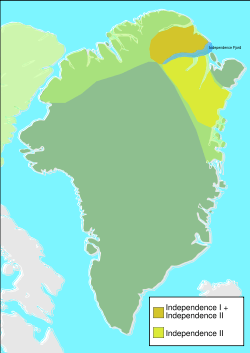Independence I culture
Independence I was a culture of Paleo-Eskimos who lived in northern Greenland and the Canadian Arctic between 2400 and 1000 BC.

It is named after Independence Fjord. They lived at the same time as the Saqqaq culture of southern Greenland. The Independence II culture had a similar geographical extent from the 8th century BC, roughly 600 years after the disappearance of Independence I. The Independence I occupation of northern Greenland appears to have been much more intensive than that of Independence II.
Radiocarbon dates and typologies of dwellings and tools do not allow distinguishing any chronological changes in the Independence I culture over its long existence (Grønnow 2016:728).[1]
The independence I culture disappeared around 1000 BC for unknown reasons. Scientists have considerably debated the reasons for why Independence I and II emerged in the isolated northeastern part of Greenland, as well as how these cultures flourished and disappeared. [2]:737
Danish explorer Eigil Knuth first recognised the existence of both Independence I and II.[3]
References
- Bjarne Grønnow (2016). "Independence I and Saqqaq: The First Greenlanders". In Max Friesen; Owen Mason (eds.). The Oxford Handbook of the Prehistoric Arctic. doi:10.1093/oxfordhb/9780199766956.013.33.
- J.F. Jensen (2016). "Greenlandic Dorset". In M. Friesen and O. Mason (ed.). The Oxford Handbook of the Prehistoric Arctic. doi:10.1093/oxfordhb/9780199766956.013.56.
However, with just 12 Greenlandic Dorset [Independence II in this context] sites known from northernmost Greenland (Grønnow and Jensen 2003), the density of the Greenlandic Dorset occupation in this region does not compare to that of the older Independence I occupation of the same area.
- Laursen, Dan (December 1996). "EIGIL GREVE KNUTH 1903 – 1996" (PDF). Arctic. ucalgary.ca. 49 (4): 401–403. doi:10.14430/arctic1216.